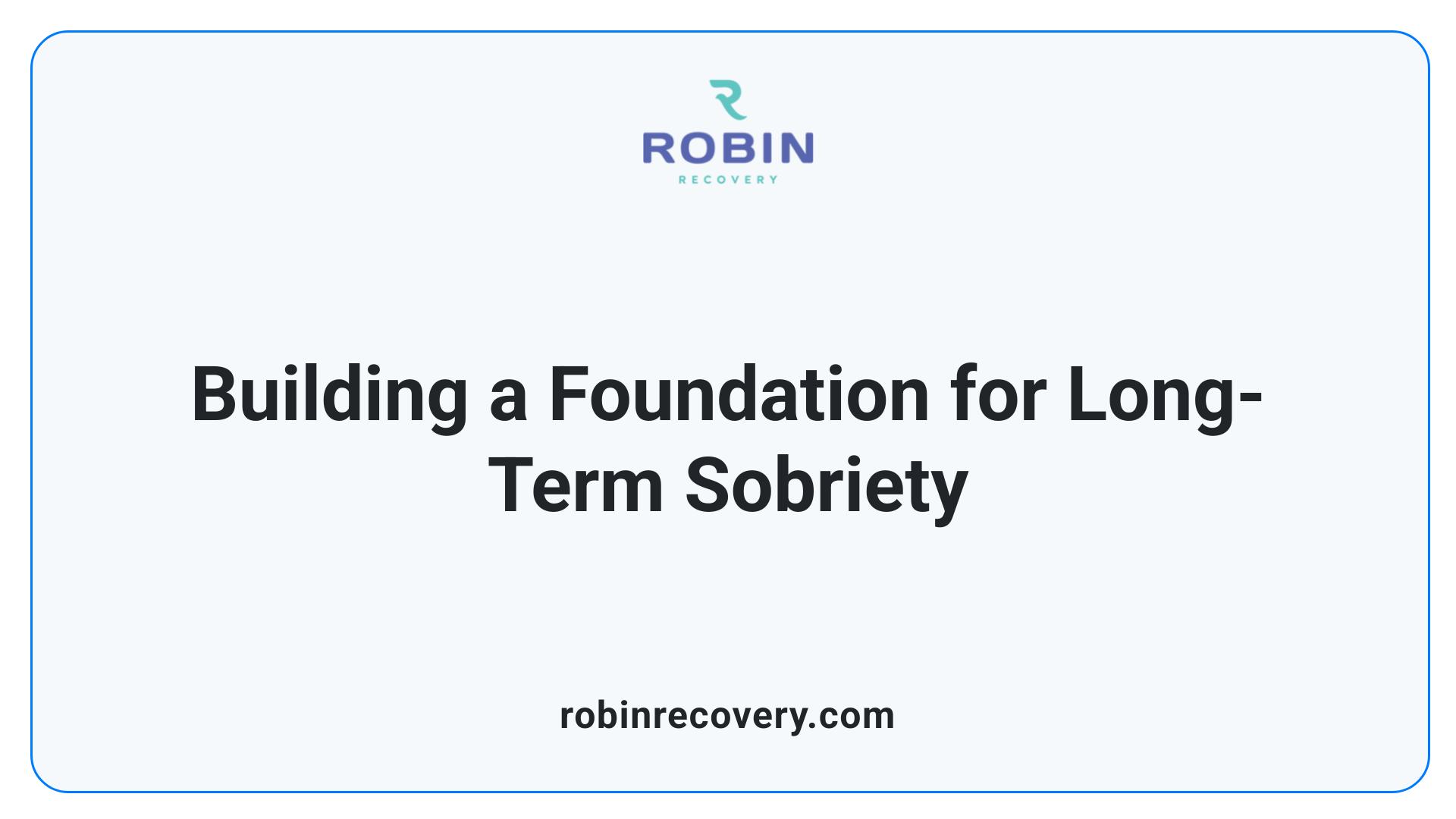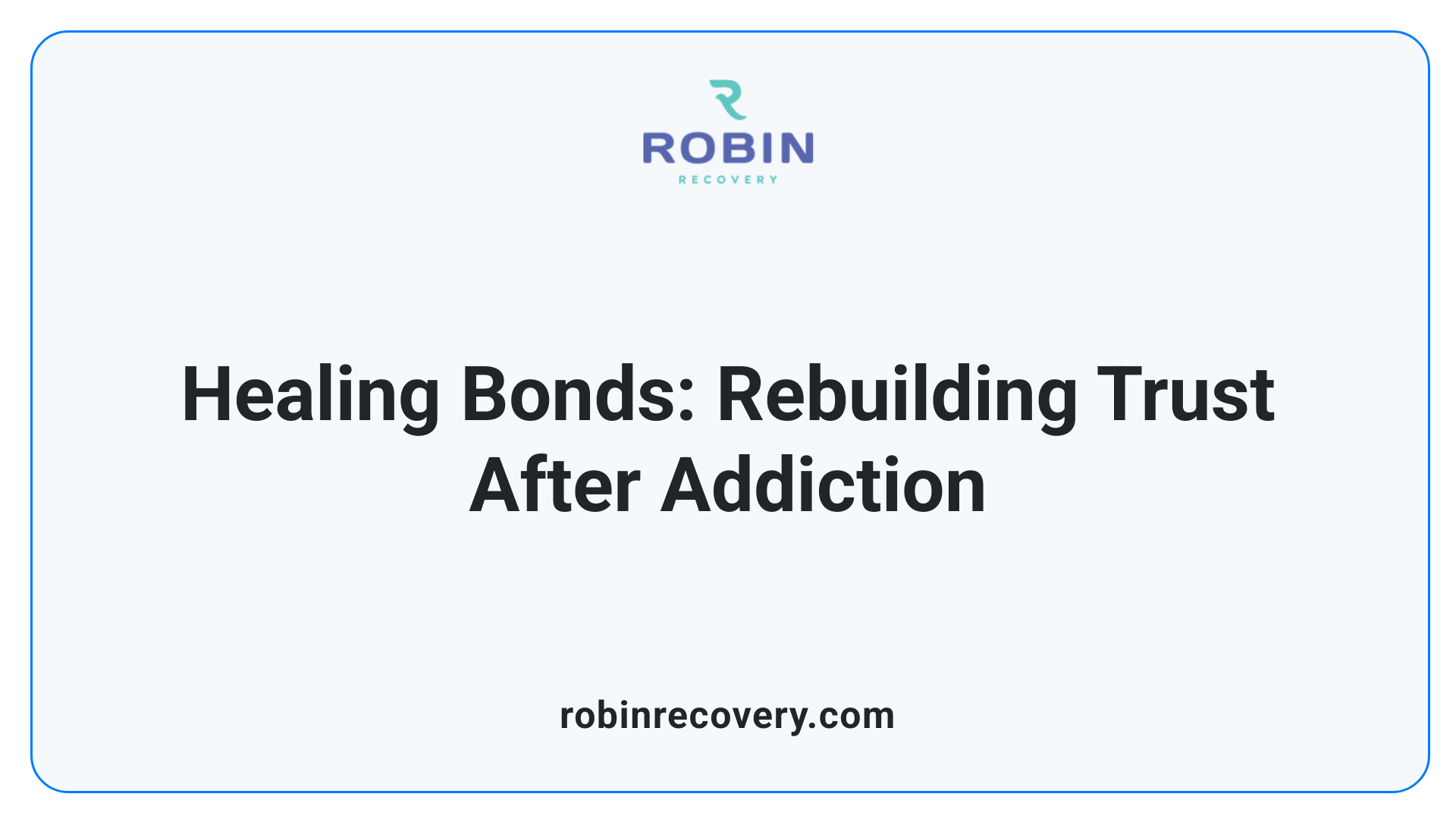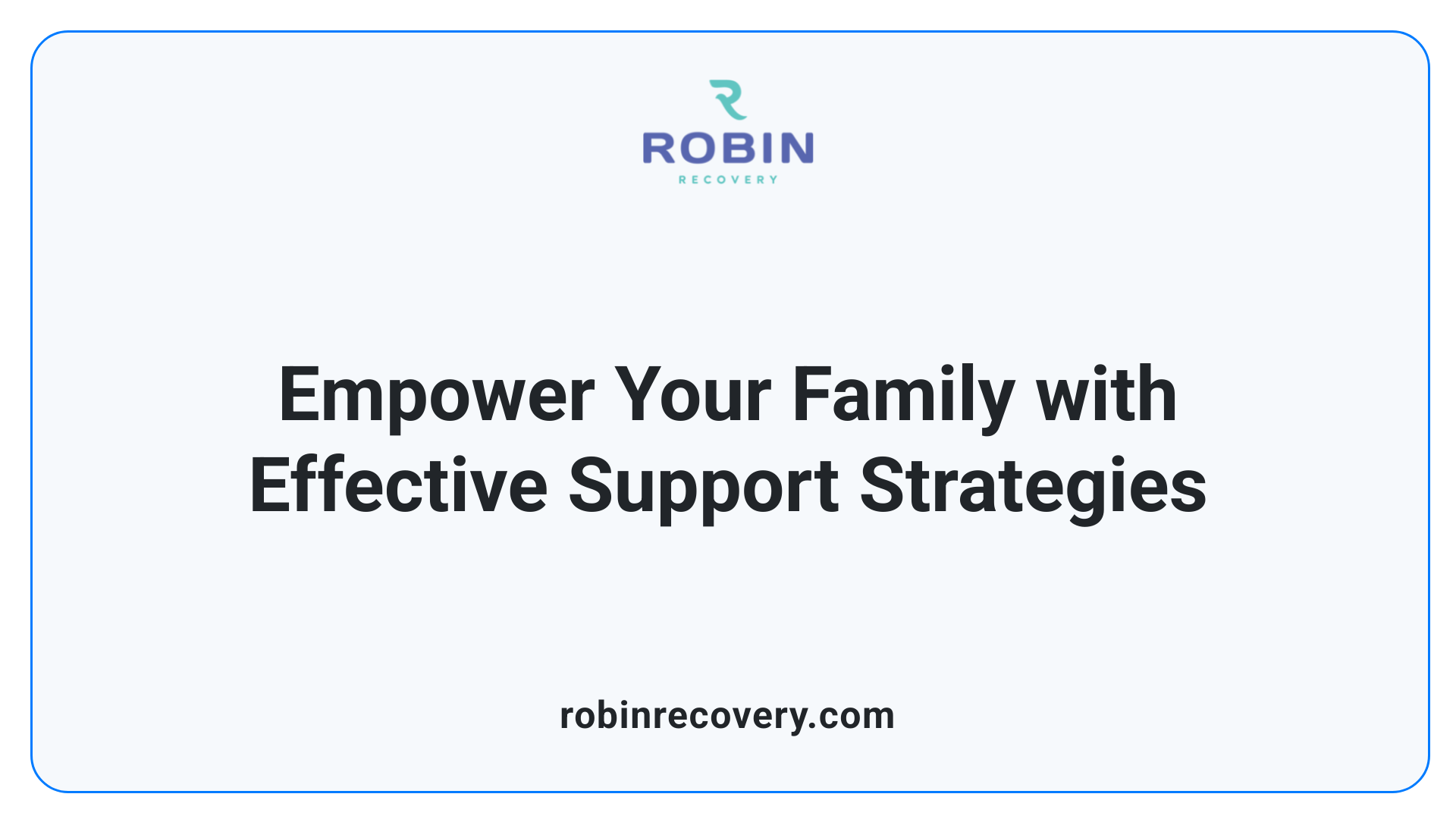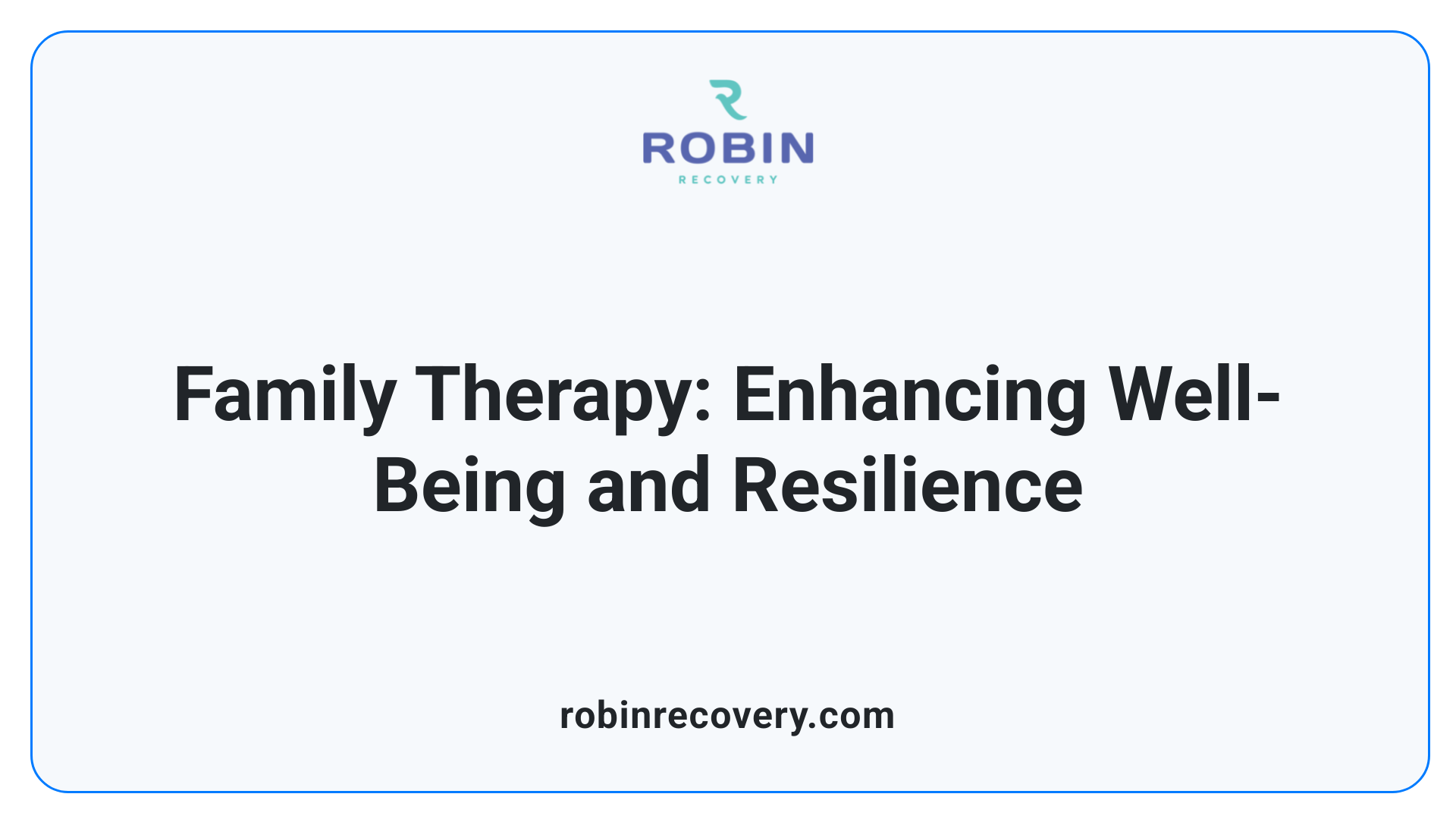How Family Therapy Builds a Foundation for Lifelong Sobriety

Understanding How Family Involvement Shapes Long-Term Recovery
Addiction is often considered a family disease, affecting not only the individual but also their loved ones. Family therapy emerges as a critical component in addressing this complex issue, offering a pathway for healing, understanding, and resilience. This article explores how structured family intervention builds a foundation for lifelong sobriety by strengthening communication, repairing relationships, and fostering ongoing support systems.
Stages of Family Therapy in Addiction Treatment

What are the typical stages of family therapy in addiction treatment?
Family therapy in addiction treatment typically unfolds through several distinct yet interconnected phases. Understanding each stage can illuminate how therapy supports recovery and strengthens family bonds.
Assessment phase: gathering information about family dynamics
The first step involves an in-depth assessment where therapists collect insights into family relationships, communication patterns, history of addiction, and current challenges. This stage helps identify dysfunctional behaviors, enabling tailored intervention strategies that address specific issues within the family system.
Engagement phase: building trust and creating a safe space
Once assessment is complete, the therapist works to establish rapport with all family members. Creating a trusting environment encourages honest communication, making it safe for members to express feelings, concerns, and frustrations without judgment. This foundation is vital for effective therapy.
Motivation/commitment: encouraging dedication to change
In this stage, family members are motivated to commit to the therapeutic process. Education about addiction fosters understanding and reduces stigma, motivating families to participate actively. Goal setting and developing shared intentions help to reinforce their dedication, fostering hope and a collaborative mindset.
Active treatment stage: implementing therapeutic techniques for change
Therapists employ specific techniques such as cognitive-behavioral strategies, role-playing, and communication exercises. This is the core of therapy, where families practice healthier interaction patterns, set boundaries, and learn conflict resolution skills. They also work on addressing enabling behaviors and strengthening emotional bonds.
Termination and aftercare: ensuring ongoing support and relapse prevention
As therapy progresses, families prepare for the conclusion of formal sessions. This phase involves reviewing gains, developing relapse prevention plans, and establishing ongoing support mechanisms. Continued engagement through support groups or follow-up sessions helps sustain recovery and maintains healthy family dynamics.
Creating a Supportive Family Environment for Long-Term Recovery

How does building a supportive family environment facilitate long-term recovery?
A nurturing family setting plays a crucial role in maintaining long-term sobriety and emotional health. It provides a foundation of stability and encouragement, helping individuals feel valued and understood throughout their recovery journey.
Family members who actively participate in therapy sessions, support groups, and educational programs develop a better understanding of addiction and mental health challenges. This shared knowledge cultivates empathy, reduces misunderstandings, and promotes supportive interactions.
Establishing healthy boundaries is vital in preventing codependency and enabling behaviors that could undermine recovery efforts. Clear boundaries help family members support sobriety responsibly, fostering accountability and responsibility.
Effective communication skills, such as honest dialogue, active listening, and conflict resolution, reinforce trust and emotional bonds among family members. When open channels of communication are present, underlying issues can be addressed early, preventing resentment and conflict.
Supporting ongoing treatment includes encouraging participation in relapse prevention strategies and recognizing early signs of distress. Emotional support—like empathetic listening and creating a safe, non-judgmental space—boosts self-esteem and provides comfort during difficult times.
A family that is well-informed about addiction as a disease, aware of potential triggers, and ready to help manage stressors creates a resilient environment for recovery. This supportive environment not only helps prevent relapse but also nurtures personal growth and strengthens relationships.
In conclusion, a family environment rooted in mutual respect, understanding, and proactive engagement is essential for sustained recovery. It enhances resilience, encourages responsibility, and fosters a sense of belonging—all of which are fundamental to long-term success.
Rebuilding Trust and Repairing Relationships Damaged by Addiction

How can family therapy help rebuild relationships damaged by addiction?
Family therapy plays a crucial role in mending relationships that have been strained or broken due to addiction. It offers a structured and safe environment where family members can openly communicate and express their feelings, concerns, and frustrations. This openness helps to clarify misunderstandings, reduce blame, and foster understanding among loved ones.
One of the core benefits of family therapy is teaching effective communication skills. Family members learn how to listen actively, express emotions constructively, and discuss sensitive issues without judgment. These skills promote healthier interactions and establish a foundation of trust.
Addressing underlying hurts and trauma is another vital aspect. Addiction often leaves emotional wounds—resentment, guilt, or trauma—that can prevent healing. Through guided conversations, therapy helps families acknowledge these feelings, resolve conflicts, and work toward forgiveness.
Techniques such as conflict resolution, forgiveness exercises, and emotional validation are employed to help families navigate complex relational dynamics. This process not only repairs fractured bonds but also builds resilience and empathy, creating a supportive environment conducive to long-term recovery.
Furthermore, family therapy encourages the rebuilding of emotional connections. It aims to restore trust by fostering honest dialogue and mutual respect. Therapists facilitate this process by guiding families in setting healthy boundaries and developing shared goals.
In summary, family therapy nurtures healing by creating a space for honest expression, addressing deep-seated hurts, and equipping families with the tools necessary to reconnect and thrive beyond addiction. This process not only repairs relationships but also strengthens the family unit, providing a strong support network essential for sustained recovery.
Role of Education in Enhancing Family Support and Reducing Stigma
Understanding addiction as a disease
Education plays a vital role in helping families comprehend addiction as a chronic disease that involves biological, psychological, and social factors. When families learn about the nature of addiction, they gain a clearer perspective that it is not simply a matter of willpower but a complex condition requiring compassionate, informed support.
Biological, psychological, and social factors
Addiction affects the brain's chemistry and functioning, influenced by genetic predispositions, mental health issues, and environmental factors such as family dynamics or trauma. Recognizing these elements can help families avoid blame and instead focus on providing appropriate care and understanding.
Reducing blame and fostering compassion
By understanding addiction’s root causes, family members can reduce harmful judgments and stigma. Education about how addiction impacts the brain and behavior fosters compassion, encouraging a supportive environment that is essential for recovery. When families see addiction as a disease, shame diminishes, and motivation to support treatment increases.
Supporting recovery through informed support
With increased knowledge, families can better support their loved ones by participating in family therapy, setting healthy boundaries, and providing emotional encouragement. Educated family members are also better equipped to spot early signs of relapse, address enabling behaviors, and foster a home environment conducive to sobriety.
Evidence on family support and dynamics in sobriety
Research indicates that active family involvement and healthy relationship dynamics significantly enhance recovery outcomes. Effective communication, understanding addiction's nature, and supportive behaviors are linked to higher rates of treatment adherence and sustained sobriety. Programs like Behavioral Couples Therapy and family-based interventions demonstrate that educating families about addiction improves engagement and reduces relapse risks.
Aspect Impact Additional Details Understanding addiction Reduces stigma Explains addiction as a disease involving brain changes, not moral failure Family communication Improves support Encourages honest, judgment-free conversations about concerns and needs Boundary setting Promotes responsibility Guides families to support recovery without enabling behaviors Education resources Enhances engagement Provides facts, success stories, and coping strategies
In sum, educating families about the multifaceted nature of addiction empowers them to provide stable, compassionate support, ultimately strengthening recovery efforts and fostering healthier family environments.
Techniques, Skills, and Strategies for Supporting Recovery at Home

How does family therapy support lifelong sobriety and recovery success?
Family therapy plays a vital role in maintaining long-term recovery by fostering open communication, rebuilding trust, and strengthening family bonds. It helps family members understand the impact of addiction and encourages supportive behaviors that reduce enabling and codependency. Through tools like psychoeducation, conflict resolution, and emotional support, family therapy addresses underlying family issues such as trauma and dysfunctional patterns, creating a healthier environment conducive to sobriety.
Engaging family members in treatment enhances motivation and commitment, which are crucial for ongoing recovery. Therapy sessions teach families how to recognize relapse triggers, establish healthy boundaries, and support responsible substance use. This collaborative approach provides families with relapse prevention strategies, ensuring they can effectively support their loved one's journey toward lasting sobriety.
In addition, family therapy offers continuous support through education and skill-building, nurturing a sense of connection and shared responsibility. When families are equipped with the right skills—such as effective communication, boundary setting, and recognizing enabling behaviors—they become powerful allies in the recovery process.
Overall, by promoting healthier interactions, addressing family trauma, and fostering a supportive home environment, family therapy significantly increases the chances of sustained sobriety and recovery success.
The Broader Impact of Family Therapy on Individual and Family Well-Being

Why is family support systems important in sustaining sobriety over time?
Family support structures play a crucial role in maintaining long-term recovery from addiction. They offer emotional encouragement, reassurance, and a sense of belonging that motivate individuals to stay committed to sobriety. Educating family members about addiction as a disease helps reduce stigma and fosters understanding, which is vital for providing appropriate support without enabling harmful behaviors.
A supportive family environment can help monitor potential relapse triggers, set healthy boundaries, and encourage ongoing engagement with treatment or support groups. This stable environment creates a foundation for resilience, making it easier for individuals to navigate the ups and downs of recovery.
Active participation in family therapy strengthens communication, enhances empathy, and rebuilds relationships, all of which contribute to a resilient support network. Such systems help individuals feel understood and validated, reducing feelings of isolation and shame. Overall, families that are informed, patient, and supportive serve as a vital resource, helping individuals develop sustainable, sober lifestyles.
Family healing and emotional reconnection
Family therapy offers a safe space for healing emotional wounds inflicted by addiction. It encourages open discussions about pain, betrayal, and misunderstandings, fostering forgiveness and reconciliation. These conversations can repair fractured relationships and create a renewed sense of trust.
By working through past hurts, families can rebuild emotional bonds that may have been damaged. This process promotes collective resilience and mutual support, essential for a sustained recovery journey.
Addressing intergenerational patterns and trauma
Addiction often runs through family generations, influenced by unresolved trauma or dysfunctional patterns. Family therapy helps identify and break these cycles by addressing underlying issues such as trauma, abuse, or neglect.
Interventions include acknowledging past hurts, understanding how patterns are passed down, and developing healthier ways of coping. These efforts promote healing across generations and foster healthier, more supportive family environments.
Enhancing overall family functioning and resilience
Effective family therapy focuses on improving communication, establishing healthy boundaries, and resolving conflicts. These changes create more adaptive family dynamics that support recovery.
Families become better equipped to handle stressors and challenges related to addiction, thereby increasing their resilience. Improved functioning leads to a positive feedback loop where supportive interactions reinforce each other, strengthening the family system as a whole.
Creating a culture of ongoing support and understanding
Establishing a continuous support culture within the family encourages ongoing learning and emotional availability. Families are educated about addiction, trauma, and recovery processes, which helps them sustain an empathetic environment.
This ongoing support reduces feelings of shame and judgment, fostering acceptance and patience. It enables family members to participate actively in the recovery process, creating a nurturing atmosphere that promotes lasting change.
The importance of continued family involvement
Sustained family involvement beyond initial treatment phases helps prevent relapse and supports long-term sobriety. Ongoing engagement includes regular family therapy sessions, participating in support groups, and maintaining open communication.
These consistent efforts reinforce the skills learned in therapy and help address emerging challenges promptly. Persistent family involvement cultivates a strong, stable foundation that enhances recovery outcomes and overall family well-being.
Aspect How It Contributes Additional Insights Emotional reconnection Rebuilds trust, heals emotional wounds Facilitates forgiveness, promotes mutual understanding Generational healing Breaks destructive family patterns Addresses trauma, improves family legacy Family functioning Enhances communication, establishes boundaries Strengthens resilience and adaptive skills Continuous support Maintains sobriety, prevents relapse Encourages ongoing learning, patience, and empathy
Fostering a healthy family environment through ongoing support is essential for enduring recovery. It nurtures emotional bonds, addresses deep-rooted issues, and creates a resilient system capable of supporting the individual’s journey toward sustained sobriety.
Fostering Sustainable Sobriety Through Family Healing
In conclusion, family therapy is a vital component in building a resilient foundation for lifelong sobriety. It facilitates systemic change by improving communication, addressing familial trauma, and establishing healthy boundaries. Through education, emotional support, and skill development, families become active partners in the recovery journey, supporting sustained abstinence and emotional well-being. The evidence underscores the importance of family involvement not only in initial treatment but also in ongoing recovery efforts. By fostering understanding, compassion, and resilience within the family system, family therapy helps individuals achieve and maintain long-term sobriety, ultimately creating healthier families and communities.
References
- The Impact of Family Therapy in Addiction Recovery and Healing
- How Family Therapy Plays a Crucial Role in Addiction Recovery
- 5 Benefits of Family Therapy in Treating Drug Addiction
- 10 Benefits of Family Therapy for Addiction - My Time Recovery
- Family Involvement in Treatment and Recovery for Substance Use ...
- Why Family Therapy for Addiction Matters - The Berman Center
- Family Therapy: A Powerful Tool in the Recovery Process
- The Role of Family Support in Addiction Treatment
- The Role of the Family in Alcohol Use Disorder Recovery for Adults
- Family Therapy in Addiction Treatment: Strengthening Bonds
